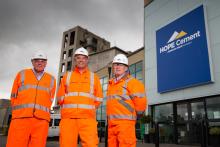
Already Britain’s largest independent construction materials group following last year’s purchase of Hope Construction Materials, the highly ambitious and entrepreneurial Breedon Group is hungry to build on its stellar performance in 2016. ABE editor Guy Woodford went to meet the Group’s chief executive to learn more about Breedon’s business philosophy and its exciting future plans.
On arriving at
Holding over 750 million tonnes of mineral reserves and resources and operating nearly 300 sites, including around 60 quarries, across England, Scotland and Wales, Breedon’s strategy is to continue growing through consolidation of the UK heavyside building materials sector following last summer’s record £336 million (€397.5mn) purchase of
Following these key 2016 acquisitions, Breedon now operates as three divisions. Breedon Southern and Breedon Northern are both fully-integrated aggregates businesses with extensive networks of quarries, ready-mixed concrete and asphalt plants and well-established surfacing and contracting operations. Hope Cement is the UK’s only independent producer and importer of cement and cementitious products, with national reach through an extensive rail network and strategically located local depots.
Breedon’s audited annual results for the year ended 31 December 2016, showed an impressive 43% increase in revenue to £454.7 million, compared to £318.5 million in 2015. Profit before tax stood at £46.8 million – an increase of 50% on £31.3 million the previous year.
In 2016, the group sold 11.4 million tonnes of aggregates (2015: 8.7 million tonnes), 1.9 million tonnes of asphalt (2015: 1.8 million tonnes) and 1.9 million m³ of ready-mixed concrete (2015: 0.9 million m³).
As Breedon chief executive, Pat Ward, notes, the Group’s eye-catching 2016 results were made possible in part by the landmark acquisition of Hope Construction Materials.
“2016 was an excellent year for Breedon, exceeding the market’s expectations. We were able to go through the CMA [Competition & Markets Authority] process associated with the Hope acquisition from January to August, whilst still maintaining our discipline in the existing business. Hope’s management and employees did the same and this meant when the acquisition completed on 1st August, we were able to continue on the front foot and deliver great combined results at the end of the year.”
Ward said Breedon’s 2016 results had also benefited from Breedon’s ability to accelerate some of the £10 million of acquisition synergies due to be realised over three years.
“One of the key decisions we made was to put all three divisions onto a common Breedon IT platform and we were able to move more quickly than we had originally anticipated on integrating the Northern and Southern divisions. The only division that isn’t there yet is the cement business (
“We also put in place a new general management structure last October, which meant we could set up a regional focus within each of our divisions. We strongly believe that Breedon is essentially a regional player. If you look at Breedon and Hope combined, naturally you can see it as more of a national organisation, but while we have that ability to perform nationally for major customers, many of our markets are still very local and our relationships are value-driven. We’ll never lose that focus on small local markets within our sales regions.”
One example of Breedon’s ability to supply major customers is its joint venture contract with Whitemountain, worth up to £55 million, to supply and lay more than 500,000 tonnes of asphalt on the £745 million Aberdeen bypass in North East Scotland, also known as the Aberdeen Western Peripheral Route/Balmedie–Tipperty (AWPR-BT) project.
The AWPR project is the longest road construction project currently under construction in the UK, extending from Stonehaven in the south to Tipperty in the north, comprising 55km of dual carriageway, 22km of slip roads and 39km of side roads and accesses.
Ward emphasises that the new Breedon Group general management structure has a near 50-50 split between Breedon and former Hope colleagues. “We’ve also brought some new people into the organisation, as we felt there were areas we needed to strengthen. For example, we’ve got a new regional director for the Central region of Breedon Southern, who was a long-established regional director with
Referencing the construction of the new Breedon Group and Southern HQ, Ward continued: “Peter Tom [Breedon Group chairman] and Simon Vivian [former Breedon Aggregates chief executive, now Breedon Group non-executive director] built Breedon upon a set of unbreakable golden rules, one of which was always to have office facilities within properties you own. You want people looking out the window and seeing quarries, ready-mixed concrete trucks, and other machines and understanding what we do for a living.
“The development of our new offices will contribute to the synergies we’re delivering from the Hope acquisition, in parallel with the creation of Breedon’s new IT platform. We started to build them at the beginning of the year and they will be completed in July.
“Unfortunately, not everybody is making it through to the new organisation, due to efficiency-driven synergies. What has been really striking, though, is that the employees who won’t be part of the new organisation have been performing brilliantly. The collection from the cash side of the business has been excellent. Those people have delivered above and beyond what you’d expect.”
Speaking about the significance of the Hope acquisition, Ward said: “Hope represents continued growth in our business. The acquisition has significantly improved our geographical spread, and on a product basis, whilst it enhances our ready-mixed concrete and aggregates ability, it also brings a cement plant in, creating a completely new product line for the company. Dowlow Quarry [Buxton, Derbyshire], which was one of Hope’s major quarries, is also rail-connected, giving us the ability to transport aggregate further than you usually do in road-based distribution; this ultimately opens up the South East England market for us, which is traditionally the largest individual market in the UK, but one we have, up to now, not participated in.
“Hope also invested just over £14 million in a new cement distribution depot and bagging plant in Dagenham, Essex. That opened around the time the acquisition was completed, and offers an exciting prospect for us.
“What’s more, the geographical reach provided by the Hope acquisition gives us greater opportunities for further smaller bolt-on acquisitions in the aggregates, ready-mixed and cement sectors. Sherburn was a perfect example of this.
“The Sherburn acquisition not only gave us additional quarries and readymix plants, but also two cement import terminals. That means we can supplement and support our cement plant, making it easier to plan plant maintenance and giving us an even greater opportunity to grow the cement importation side of the business.”
For Ward, Breedon has a key strength. “It’s a really entrepreneurial organisation. You can see this in Breedon’s organic growth over the years, through its investment in continuous operational improvement and in new quarries, asphalt and ready-mixed concrete plants. These investments will continue and our challenge is to ensure that we do not lose our agility now that we have critical mass in those areas of the business. We also need to continue applying real rigour in maximising the value of the overall business, and of the businesses we bring in.
“We aim to spend £40-£50 million on bolt-on acquisitions every year. Whether it’s a £1 million deal or £300 million-odd deal, it must bring value to Breedon. If the right deal comes along, we’re ready from a management perspective and our shareholders are ready to support us.”
Recruiting Ward as Group chief executive in January 2016 was something of a coup for Breedon. The Scottish national has more than 30 years’ experience in the aggregates and construction industries in the UK, US and Middle East. After working in a variety of roles for ARC/
After serving in several general management positions in AI UK’s aggregates and asphalt divisions, in 1999 he moved to Denver as vice president of AI USA’s West Central Region, later becoming senior vice president of that region, which in 2007 expanded to become the Western and Mid-Atlantic Region, employing over 2,000 people. In his last role before joining Breedon, Ward was CEO of AI Europe from April 2014 to January 2016, assuming responsibility for an international business with over 4,000 employees. Of his own and his Breedon executive team colleagues’ approach to running the Group, Ward said: “Visibility is important to me and safety is an absolute priority. When we have our executive management meetings, we always precede the meeting with a half-day visit to part of the business. Last week we were in Scotland. We were having the meeting in Glasgow, so the afternoon prior to the meeting saw the executive team split up and go with local managers to various parts of the business and engage with employees.
We then invite the local managers to the executive safety meeting where we review the visits and discuss the company’s approach to safety.”
The Breedon Group’s independent status was a key factor in Ward’s decision to leave his highly successful career with AI. “We live or die by our own sword, and as long as we are performing and generating the returns, the money will be there to continue growing the business.
“There’s probably no one else in our sector investing 120-125% of their depreciation back into the business, in order to support growth.
“I think we’re also moving to becoming an employer of choice in this sector. We’re a success story and people like the way we work. If you join our team and have a good idea that can generate a good return, you can execute it. That’s the entrepreneurial spirit of Breedon.”





